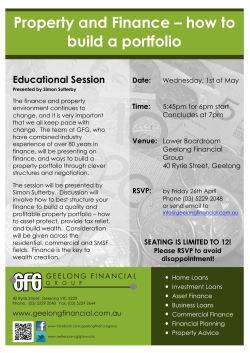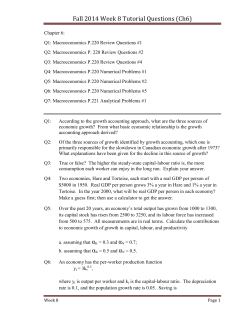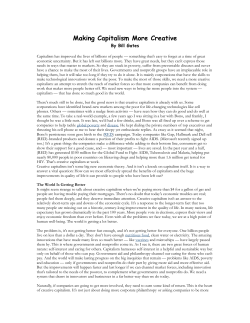
Document 221536
Date : August, 01 , 2010 Publication : Destiny Page Number: 168-171 WEALTH REPORT Personal Finance Guide WRITTEN BY CARA BOUWEP , i% / r i i # How to Become a Millionaire There's no fail-safe "blueprint" for acquiring wealth. But if you learn from the lessons of experts, the greats and those blazing new trails, you could pick up some crucial markers GET THE BASICS RIGHT Ashley Bryant Wagner, a Personal Financial Advisor w i t h O l d Mutual PFA, highlights five essentials: • Always pay yourself first. T h i s w i l l teach you to be more responsible w i t h your money. • Have a clear idea o f your goals and what you're saving for. • Knowledge is power. Do you know exactly what you earn and where your money goes? • Getting out o f debt is crucial. And once you've done that, slay out o f debt, as far as possible. • T h e amount o f money you invest isn't as important as the time you leave it i n the market to grow. Many people ignore their personal finances and refuse to budget. They use their credit cards to supplement their income and have no emergency fund to d i p into in tough times. And they don't save. Wagner suggests you start controlling your money by writing your financial goals and reviewing this plan every six to 12 months. I le also offers the following simple, but effective tips: • Spend less money. • Pay cash for purchases. • Ignore credit card offerings. • Pay off credit cards. • Buy on sale. • Don't be swayed by attractive offerings. T h i n k it through. • Avoid instant gratification. Do you really need that new leather jacket right now? HAVE A PLAN A N D STICK TO IT 1 )omini(|ue Siott, Business D e velopment Executive at insurance provider PPS. l>clicves one o f the "few positive effects o f the global financial crisis has been a renewed focus by consumers on the health o f their financial affairs". Part of that process is taking a long, hard look at your personal wealth plan. "One o f the biggest factors is planning for your retirement," says Stott. " I n order to combat the danger o f retiring without enough money, it's important to undertake a financial needs analysis. T h i s w i l l identify how much money you need to retire comfortably and whether you're on track with your current retirement plans." A financial needs analysis w i l l also expose any glaring gaps in your planning pr<K:css. For example, says Stott, a "common trap many people fall into is viewing their house as a savings vehicle. When you see your house appreciating from its original purchase price, it's easy to feel cashrich. But you'll still need to live somewhere i f you sell it. and paying rent can quickly deplete savings." She adds: "One of the best ways page 168 | AUGUST 2010 Page 1 / 4 Size=a9QK29Zmm Circulation: 25752 Readership: 28726 to plan for your future is to speak to an independent financial advisor. Choose one who'll offer guidance when the going gets tough. A n d , once you have a plan, stick to it." INCREASE YOUR EARNING POTENTIAL Before you increase your wealth, it's important to increase your worth. Krica Stuart from Liberty Group Advisory Services says that for many South African women, the link between their career decisions and their financial aspirations is often blurred. "For most women, landing a job straight out of school or after university is the first major objective - we probably don't think about our career aspirations initially. Eventually we get experience i n a certain field, but we find it difficult to step out o f it and try something new." Stuart's approach is practical. " W h e n you start working, it's best to stay in a job for t w o or three years. T h e n you need to look at your skill set and what you're earning and benchmark this against what other companies arc offering for the same skills and level o f experience." Start by speaking to a recruiter about the marketability o f your skills, look at newspapers and go online to see what jobs are adver- Date : August, 01 , 2010 Publication : Destiny Page Number: 168-171 WEALTH REPORT tiscd. Sometimes a career change is the only thing that will give you a bcttcr-rhan-inflation increase. Don't wait for things to happen - IK- proactive and make them happen. Take steps to own your career and achieve your financial aspirations. Stuart herself made a radical career move just under a decade ago. "I was retrenched from my scriptwritingjob in 2001 and was initially very stressed about it, but it ended up being the best thing for Page 2 / 4 Size=9SK229?rmm C$iraLfftticin23333H3add&?t3rpp238Z06 IVrsonal Kiiumcc (iuide me because it forced me to rc-cvaluatc my career." She also stresses that it's important not to be afraid to negotiate for a higher package, based on your skills and strengths. "During the negotiation phase of a new job. > Date : August, 01 , 2010 Publication : Destiny Page Number: 168-171 WEALTH REPORT P e r s o n a l Fi nance Guide women tend to focus on things like first step i n gauging your disposable creches and maternity leave policies income. Capitec suggests this idea i f you have difficulty sticking to a savings plan, as they limit the and neglect comprehensive discussions about future financial oppor- five-step plan o f action: access to your money. • Start a finance file where you can store your receipts and " N o matter how small the amount - even just R20 a month, tunities with the company. T h e y ' r e also too quick to apologise and back down when having difficult discussions about money. Men are more confident in their skills and know what they contribute to an organisation. Remember, the more experi- bank statements. if that's all you can afford - it's • Add up your monthly after-tax income (eg salary, overtime • Add up your necessary monthly expenses (rent. bond, car payments, policies, school fees, living empowered you'll be." Stuart offers these tips for expenses, petrol, medical bills. that will enhance your skill set. • Study further, even i f you have to do this part-time while you work. • Explore the learning or upskilling opportunities i n your company. • Once you've upped the ante in your salary package, turn your stresses Fischer. payments). ence and skills you have, the more increasing your earning potential: • Enrol for a course or qualification never too late to start saving," telephone, water and electricity, bank charges, entertainment). INVEST WISELY There's a distinct difference between saving and investing. Saving is a habit of p u t t i n g money aside each month: investing takes • Add up your annual expenses that one step further and enters the realm o f wealth creation. (eg T V and car licences). • Deduct your expenses from For Candice Paine, 1 lead o f Retail at Sanlam Investment your income. Management, the need for an T h e n ensure you always pay your debts first and settle the interest before assessing your short-, medium- investment plan created in conjunction with a reputable and long-term savings goals. Get financial advisor is key - and you shouldn't change it, or divert from into the habit o f saving by setting up a debit order from your transac- it. " T h i s plan should spell out your financial objectives and the tion account into your savings investment performance you need account. Capitec also suggests saving bonuses or overtime to achieve to meet them. A key component o f it is setting a realistic payments, rather than blowing them on impulse buys. time horizon. T h e plan should take into account not only the returns you need, but also the risks you're every R100 earned. But it's vital t o Remember, your approach t o saving depends on your goals and put something away for a rainy day. Carl Fischer, Executive: Marketing time frame. Fischer breaks it down as follows: and Corporate Affairs at Capitec Bank, recommends sticking to a S h o r t - t e r m : I f you need attention to wealth creation. "Start saving. Speak to a financial advisor about the best product out there for y o u , " says Stuart. D O N ' T S P E N D IT - S A V E I T ! According to Capitec Bank, most South Africans save only 2c for flexibility. prepared to take. For instance. how do you really feel about losing money?" she says. A " r i s k y " investment is usually choose a savings plan or money market account that gives you regarded as something like equities. "because they can be volatile and For example, it w i l l help ensure that important debts such as rent immediate access to your money, should an emergency arise. L o n g - t e r m : Consider a 32-day you may lose money, particularly during times of turbulence and and loans arc paid before you consider buying luxury items." notice account, savings policy or unit trusts. These offer a lower Fischer says identifying your current spending patterns is the risk, biii higher potential payouts. Longer-term options are also a good careful budget. " T h i s w i l l guide your spending in a responsible way. page 170 I AUGUST 2010 Page 3 / 4 Size=a86X287mm Circulation: 25752 Readership: 28726 uncertainty", explains Paine. "1 lowever. 90 years o f return data show they've delivered the best results over time." I n contrast, investing in money Date : August, 01 , 2010 Publication : Destiny Page Number: 168-171 WEALTH REPORT market funds or cash is often perceived as the "safest" investment option. I lowever, says Paine: "In reality, cash exposes investors to the less obvious risk of their investment not keeping pace with inflation, which means the real value of your money is eroded over time." Paine highlights these cardinal rules: Stock markets aren't "get-rich(juick schemes". Few investors become wealthy on the basis of stock tips or trying to time the market. Page 4 / 4 Size=aiB2G9ftmm C$iral^tirjn23333H3add&?&rpp238Z06 Personal Finance Guide It's much more important to consider the underlying value of the stoek market than deciding whether and where to invest. It's usually wiser to opt for a professional investment manager with a proven performance track record. •
© Copyright 2025





















